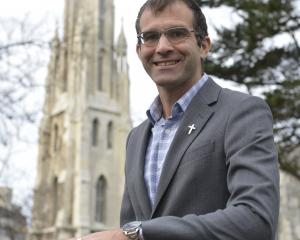
There has been a lot of chatter over the past few weeks about a couple of sermons.
The first sermon to hit the headlines this year was preached on January 21 by Episcopal Bishop Mariann Budde at the interfaith prayer service held at the Washington National Cathedral the day after President Donald Trump’s inauguration.
Less than four weeks later, the sermon had been viewed by over half a million people on the cathedral’s YouTube channel alone. A Democracy Now! clip including the final few minutes (in which Budde made a direct appeal to Trump "to have mercy upon the people in our country who are scared now") was viewed by another half million people. The Washington Post had 140,000 views of the split screen video showing both the end of the sermon and the real-time reaction from the president and his entourage. And that’s just a selection. Over one million viewers watched a subsequent interview with Budde.
In case you missed it, Trump did not like the sermon. He said the service was "not too exciting," reckoning "they could do much better." Later he doubled down on his criticism of the "so-called bishop" calling her a "Radical Left hard-line Trump hater". The sermon was "nasty in tone," and Budde was "not compelling or smart".
Much of the talk has been about the part of the sermon that contained a direct appeal to Trump. In those final few minutes, Budde named specific communities that were "scared": transgender children, migrants and refugees. The events of the past few weeks suggests that such fears were reasonable.
Aware many were incensed by her words (and wary and weary of misogyny that would (and did) brand her a Jezebel on account of her gender), I took a closer look.
The sermon lasted for just under 15 minutes. Budde opened with prayer before reading Matthew 7:24-29, on the wise man who built his house on the rock. During the main part of the sermon, Budde named three foundations of the unity needed in the US: "honouring the inherent dignity of every human being", "honesty in both private conversation and public discourse" ,and "humility, which we all need, because we are all fallible human beings".
While obviously not
covering the entirety of Christian faith and belief, these values seem difficult to argue with. Perhaps if Budde had not gone
on to appeal directly to Trump, the sermon would have passed with less interest.
Another sermon that hit the headlines in Aotearoa recently was preached at Waitangi by the president of the Methodist Church of New Zealand, Te Aroha Rountree.
Like Budde, Rountree called for mercy. She drew on Micah 6:6-8 to do so, asking what God requires from humans. As she noted, this text communicates the pathway to living in right relationship: to act justly, love mercy, and walk humbly with God. Justice, mercy, humility.
Rountree recalled a Tiriti/Treaty signed 185 years ago in a spirit of partnership and mutual respect. She issued a challenge to the church: "We cannot claim to follow a gospel of justice while turning a blind eye to the inequities that persist in this land."
Rountree also challenged the government and was greeted with applause when, drawing on imagery from Alistair Reese, she noted that the Crown seemed to have "filed for divorce" in the marriage-like relationship of the Treaty. Tangata whenua were "blissfully unaware".
Like Budde, Rountree called for mercy. Specifically, she prayed for the justice committee, government ministers, government, and public service institutions alike to "love mercy".
Act New Zealand leader David Seymour was not impressed with the sermon, saying: "If people wonder why church attendance is in free fall, and people turn away from Christianity according to the latest Census, it’s because people try and politicise things like that."
There are echoes of Trump here, who did not like that Budde "brought her church into the world of politics in a very ungracious way".
This raises an important question: If this is what it means to be political, can one be Christian without being political? Calling for mercy and justice may be a political act, but it is surely also a necessary Christian act.
While Seymour links declining religious affiliation with churches politicising, there is no evidence that this is so. In fact, although Christian religious affiliation is certainly still declining, the rate of decline is slowing. Further, research has highlighted that a desire to make a positive contribution in the world can act as motivation for early faith exploration and ongoing faith development. This seems to be particularly true for younger people, including those who did not grow up in the church. Our world is crying out for justice and mercy.
Budde ended her sermon with these words: "May God grant us the strength and courage to honour the dignity of every human being, to speak the truth to one another in love, and walk humbly with each other and our God." May these words be true for us all.
■ Dr Lynne Taylor is a senior lecturer in the theology programme at the University of Otago.












